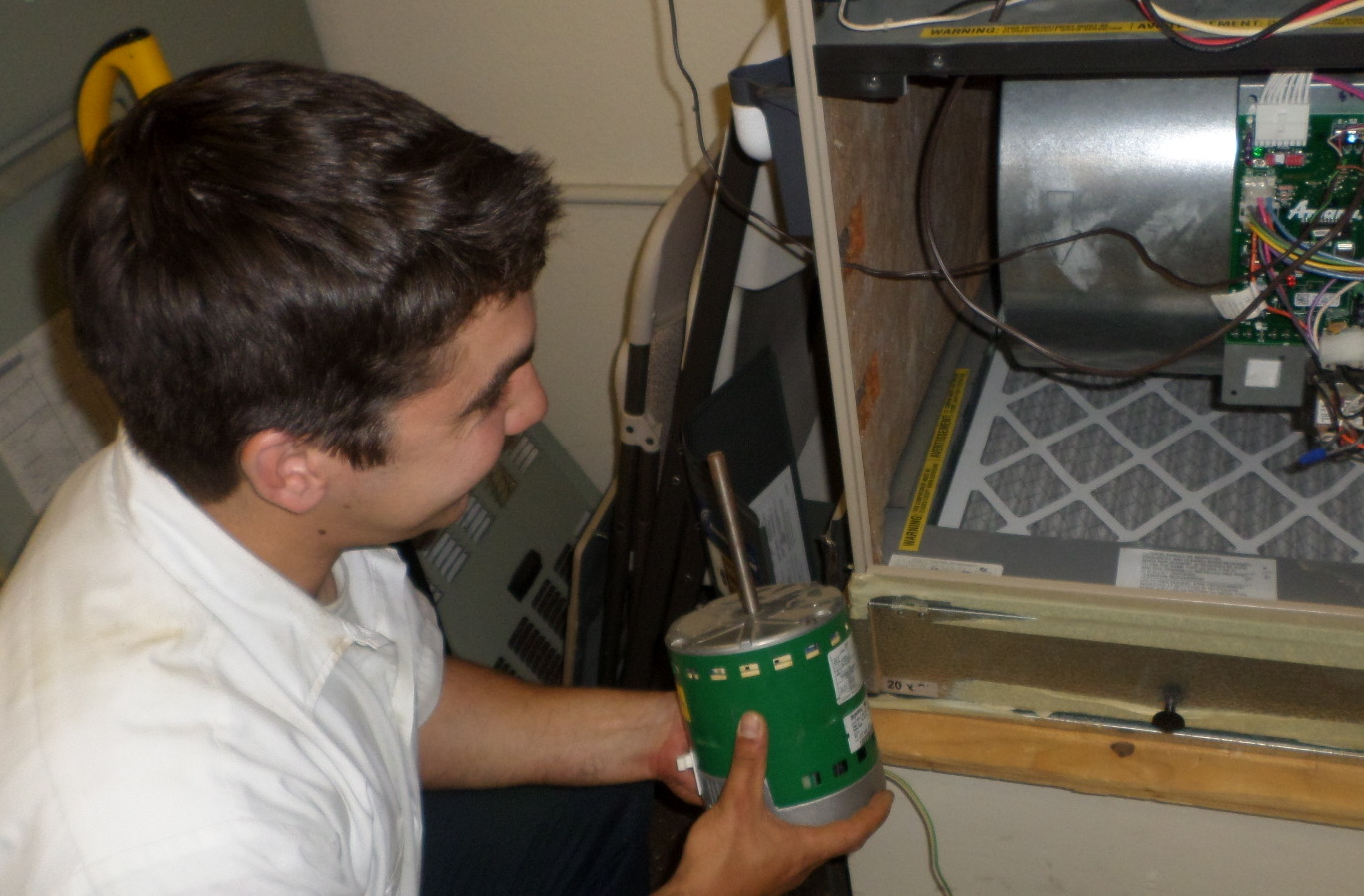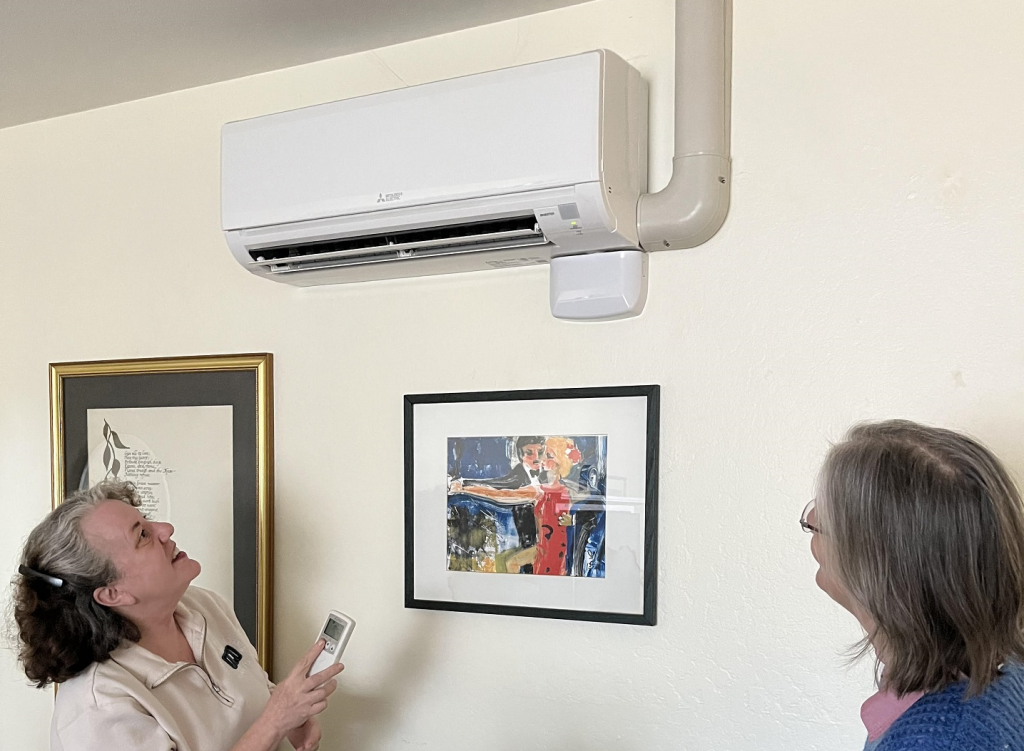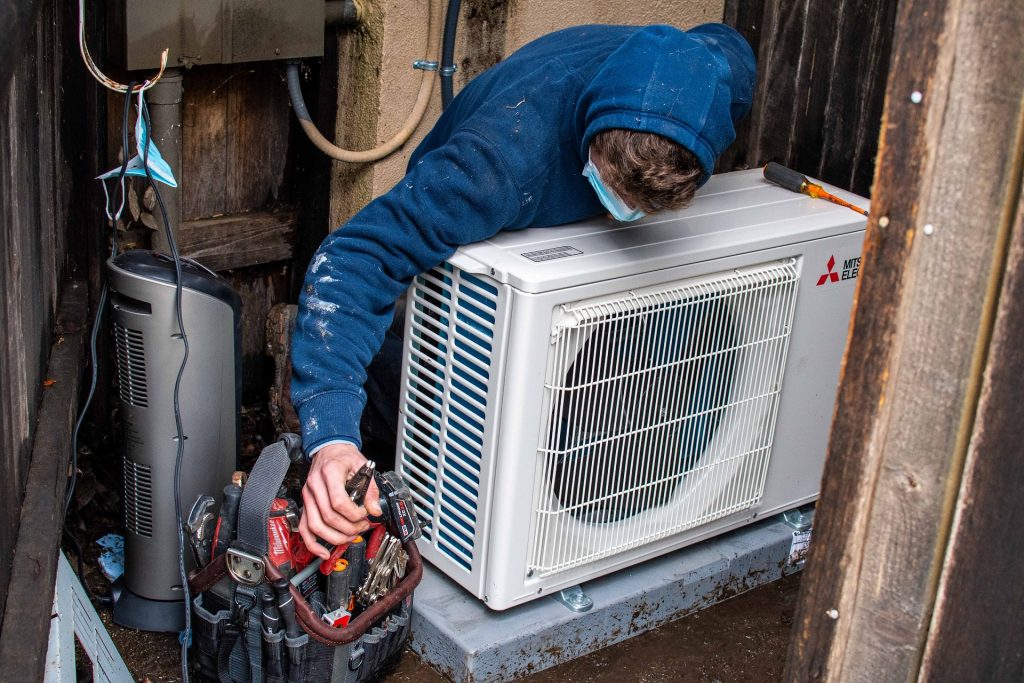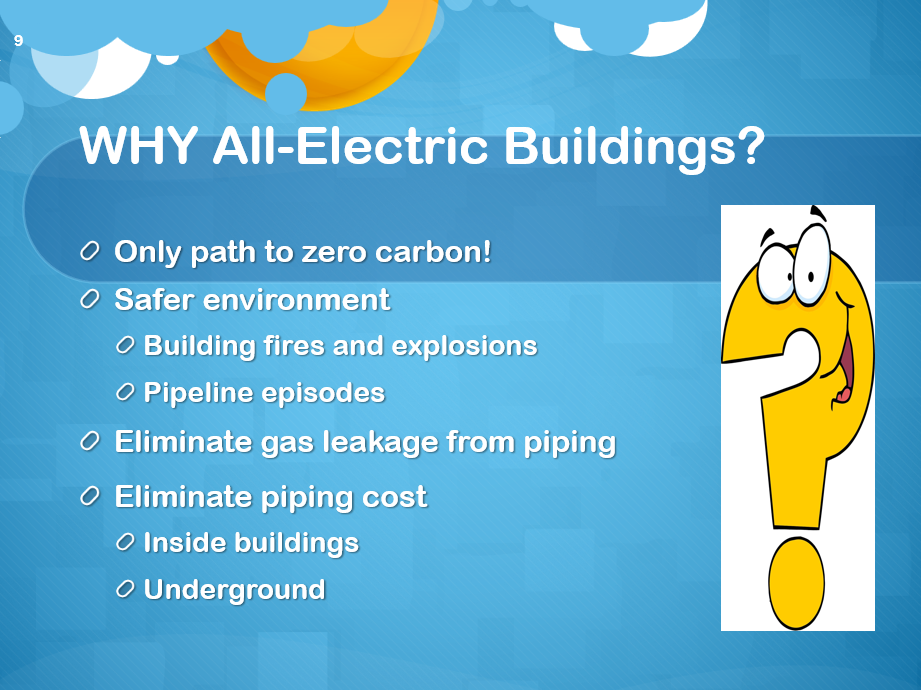COOL SOLUTION
HOME ENERGY
Get your ducts in a row and go all-electric
IS YOUR AIR CONDITIONER MORE THAN 15 YEARS OLD?
Start simple then make a plan

Is your system more than 15 years old?
Now’s a good time to start planning for the future.
Learn about your heating and cooling system
Most of us don’t pay much attention to our home heating and cooling systems until they aren’t working. But the age, condition, and management of these systems can make a big difference in family comfort and health, not to mention the size of your wallet!
What’s an HVAC system?
HVAC is shorthand for Heating, Ventilation, and Air Conditioning. HVAC systems generally include a furnace or heater, a blower or ventilation equipment to move heated or cooled air through your home, and an air conditioner to cool your home.
Why should I start planning now?
If your home is older or it’s been a while since you had your system checked, chances are it’s operating inefficiently, which can have a big impact on your energy bill. More critically, since HVAC systems have a life-expectancy of 15 to 20 years, your system could be on the verge of failing.
A plan puts you in the driver’s seat
Planning ahead allows you to make informed and deliberate HVAC and home energy efficiency decisions.
- Evaluate all your options for equipment types, costs, and financing, including rebates and incentives.
- Reduce wear and tear on a new HVAC unit by “right sizing” (getting the right size unit for your home).
- Make other energy efficiency improvements to save money and make your home more comfortable.

Energy efficiency helps!
- Switch to LEDs for lighting.
- Put up exterior shades on south and west facing windows.
- Open windows at night to cool the interior space, especially in upstairs rooms.
- Put home entertainment and office electronics on smart switches.
Take the home energy retrofit route
Depending on the age of your home, it might make sense to improve its energy efficiency first and replace the HVAC system later. Or, you could do both at the same time.
- Duct sealing (if not part of HVAC job)
- Attic and wall insulation
- Attic sealing and sealing of ceiling and wall penetrations
- Other building envelope sealing (exterior walls, roof, skylights, and doors)
- Window replacement and/or sealing
- New ceiling fans, whole house fan, attic fans
- Smart technology like smart thermostats
Basic maintenance helps systems last and reduces costs
Make sure to check your system filters (located at the return) every other month and more frequently if you have allergies, pets, or lots of foot traffic that brings in outdoor debris and dust. See our #LiveCoolDavis video about changing filters below.
An annual service check up by a heating and cooling professional will also help to keep your system running smoothly and lasting as long as possible.

Think about your family’s comfort and health needs
Evaluating your HVAC options is a good time to reflect on your family’s needs, values, and objectives.
- Does your indoor air quality need improvement?
- How often do you change filters?
- What kind of filters are you using?
- Are there drafts or hot spots in your house?
- How warm or cool do you want to be?
- Is system reliability essential?
- What about comfort needs for babies or elders?
- Are asthma or lung disease a factor?
Clean up infested insulation and dirty ducts
Dusty, moldy or infested insulation may mean you need a clean sweep of your attic. Dirty ducts can also cause efficiency and air quality problems. If you’re considering a clean up make sure that you get all your attic sealing and duct sealing done at the same time!
Clean tech can filter allergens
New systems also come with new technology to filter allergens, or catch the night breeze with built in whole house fan type features that pull in the cool night air. Cool tech and smart tech in newer HVAC design can help you solve special problems or meet the special needs of your family members.
START SIMPLE
CHANGE FILTERS REGULARLY
Routinely replacing or cleaning air filters can lower your air conditioner's energy consumption from 5 to 15%

COOL AT NIGHT FOR FREE
Take advantage of the Delta Breeze! Opening windows and running a whole-house fan at night can help you save on energy bills

FLATTEN THE ENERGY CURVE
Thermostat programming and pre-cooling can help you avoid peak energy pricing

MAKE A PLAN ... TODAY!

Get a check-up
If your HVAC system is more than 10 years old or not working properly, start by hiring a licensed HVAC contractor to evaluate its current performance and condition.
Get a Home Energy Assessment
If your home is more than 10 years old and you are considering an HVAC repair or replacement, a home energy assessment or audit is a good idea. Leaky ducts or windows mean you’re wasting money and energy to heat or cool your attic or the outdoors.
Prioritize energy efficiency
State building and appliance efficiency code requirements have changed. Most likely, a new HVAC system installed today will be much more energy efficient than your existing system.
“Right size” the system
You don’t want to invest in a larger unit than needed if, through home energy efficiency retrofits, a smaller unit meet your needs. Similarly, it may make sense to install a unit that is more energy efficient than the minimum standard required by state regulations.

What services do they provide?
- HVAC only?
- Both HVAC and energy efficiency retrofits?
- Only energy efficiency retrofits?
- Home energy assessments?
- Rooftop solar also?
- Does the contractor participate in utility rebates and/or PACE financing programs? Will the contractor handle the paperwork and what, if any, are the associated fees?
Ask about licensing and experience
- How long has the business offered its services to Davis and surrounding area residents?
- Does the contractor comply with all state and local building permit requirements?
- Is the contractor licensed by the State of California State Contractors Licensing Board? Remember, eligibility for rebates depend, in part, on using a licensed contractor.
Ask system questions, too
- How much life is left in the current system?
- What are the upfront purchase and installation costs, annual operating costs, and comparative energy efficiency ratings for different units of proposed new systems.
- How long it will take to pay back the initial cost with energy savings if you go with a more energy efficient unit?
- Can you get by with a smaller HVAC system by doing home energy efficiency improvements, like sealing the attic and adding or replacing attic insulation?

Take advantage of rebates and incentives
California residents are eligible for rebates on a variety of home energy efficiency retrofit measures, as well as for HVAC replacements. Rebates are sponsored by the State of California and administered by utilities such as PG&E.
Loans come in lots of flavors
Local banks and credit unions offer a variety of secured and unsecured loan options, while a PACE loan (Property Assessed Clean Energy) attaches the payments to your property tax bill.
Don’t leave money on the table!
- California law requires rebate applicants to use a licensed contractor, comply with relevant state and local building codes and meet state and local permitting conditions.
- Be sure to ask if your contractor participates in utility and local rebate programs and will handle the paperwork for you.
- Be certain your contractor participates in the PACE programs available in Yolo County. It’s critical to know in advance if you are contemplating using PACE financing if the contractor is eligible.
LEARN MORE ABOUT ALL-ELECTRIC HOMES

All-Electric Resources
- Cool Davis All-Electric Planning Guide
- Pocket Guide to All Electric Retrofits Redwoodenergy.net
- The Switch is On Building Decarbonization Coalition
- Why Love Electric Beneficial Electrification League of Colorado
- Go electric SMUD website
- Electrify Everything Course
Podcasts and Videos:
HEATING AND COOLING STORIES
Claire and Darell, West Davis
Bill Heinicke
Yvonne Hunter
Monica Parisi
Tell us your story! Email newseditor@cooldavis.org
Slow but Steady: The Transition to an All-Electric Home
Monica Parisi is making big changes to her East Davis home that promise benefits to her and the environment. First things first: so, in 2015 she installed solar panels, which set a strong foundation for an all-electric home. Rooftop solar gives Monica access to inexpensive…
How Smart Electrical Panels Manage Loads Possibly Avoiding the Need for Upgrades
We live in a 1991 townhouse in Davis. My goal and dream has always been to move away from our current natural gas system and fully use electricity from the sun. But how is that actually achieved? Many smaller and older homes begin life with…
Get Home Electrification Tools and Support from the Switch Is On
The Switch Is On is a collaborative campaign founded in 2019 that supports home electrification by providing tools, support, and resources for Californians, including homeowners as well as contractors. The Building Decarbonization Coalition (BDC)’s goal is to educate everyone about the importance of home electrification. What…
All-Electric Heat Pumps FAQs
By David Springer, Kristin Heinemeier, Bill Dakin, Nathan Breeding, and Dick Bourne, with contributions from Leslie Crenna The featured photo for this article is the work of Cool Davis volunteer Yvonne Hunter. Q. What is a heat pump? A. heat pump is a well-established and…
Goin’ All-In with an All-Electric Home
My wife Susan and I recently completed a transition to an all-electric home. Those old enough to remember the “Live Better Electrically” campaigns of the late 1950’s may think this is folly. The Westinghouse “total electric homes” promoted from that era promised a “home where…
Clean Energy Home Workshop Follow Up Video FINALLY Here!
THE CLEAN ENERGY HOME WORKSHOP VIDEO IS READY FOR VIEWING, FINALLY! The video from the very popular event this past August 1, 2021, is a fabulous resource for anyone looking to make a plan to incoporate efficient, all-electric heating and cooling systems in their home…
RESOURCES
- MAKE A PLAN . . . NOW: HOME HEATING AND COOLING
- HOME COMFORT AND HEALTH ISSUES: HOME HEATING AND COOLING
- UNDERSTANDING MY HOME ENERGY WORKSHEET
- ALL-ELECTRIC HOME PLANNING GUIDE
- WORKING WITH CONTRACTORS CHEAT SHEET: HOME HEATING & COOLING
- COST – BENEFIT COMPARISON CHART
- HOME HEATING AND COOLING CHEAT SHEET: WAYS TO PAY
- HOME HEATING AND COOLING COMMONLY USED TERMS
- Sign up for Flex Alerts
- Find a Licensed CA Contractor
- Find a Home Energy Rater
- Opt up to 100% Renewable Energy: Valley Clean Energy
- Find Rebates and Incentives:
- Department of Energy, Energy.gov resources
- PACE financing programs available in Davis
- CaliforniaFirst: www.renewfinancial.com/product/californiafirst
- HERO: www.heroprogram.com/Sacramento
- YGRENE: www.ygreneworks.com/improvements/







